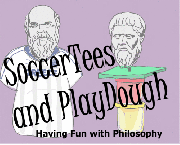You are currently browsing the tag archive for the ‘meaning’ tag.
When I was in graduate school I almost began a dissertation project on theories of reference. I have never found theories of direct reference very plausible and I wanted to show that the alleged failure of the Fregean account of reference was based more on a failure to understand the view than on its inability to account for certain linguistic intuitions. Well, of course, I discovered that many people feel the same way that I do, regardless of the fact that so many of the people I knew were convinced by Putnam and Kripke style arguments. As I went through the literature, I quickly got bored with the arguments and decided that I didn’t have much to contribute to the current debates.
I recently came across an old paper I wrote on the topic in which I suggested that some common nouns, such as ‘rock,’ ‘air,’ ‘lake,’ ‘mountain’ could not possibly fit the Kripke-Putnam paradigm because in all of these cases there is no fundamental micro-structure that all class-members have in common. It seemed to me at the time that Kripke and Putnam had, in effect, cheated by choosing terms such that most speakers already know that class membership is in virtue of micro-structure. In advance of modern chemistry, I can’t think of a reason why anyone would have supposed that all samples of gold or all samples of water have the same microstructure, anymore than prior to modern geology there would have been any reason to suppose that all samples of rock have a common micro-structure. If we had discovered that, just as in the case of ‘rock,’ not all samples of what we had been calling ‘gold’ have the same microstructure, I think we would nevertheless still have called all such samples ‘gold.’
Of course now most speakers know that all samples of gold have the same micro-structure and so it is not surprising that many of us have the intuition that, in Kripke’s scenario, the pyrites would not be the same stuff as what we call gold. And how else to express this intuition than by saying that the stuff in the mountain, in the imaginary scenario, would not be gold? But, again, this is an unfair case to test competing theories of reference; it most likely has become part of the description commonly associated with ‘gold’ that it is an element.
I concluded the paper by suggesting that, to some extent, metaphysical issues have been confused with linguistic ones. It is very plausible to say that natural kind membership is in virtue of micro-structure. And it is equally plausible that some of our natural linguistic terms will name natural kinds. But there is no way to know this in advance of scientific study. For all that was known in 1000 CE, ‘gold’ may have been more like ‘rock.’ The fact that a term does name a natural kind does not tell us anything about the theory of reference that is true of the term.
So, in any event, I submitted this paper to a couple of places and got some very vigorous rejections (blind reviewers can be vicious), so I assumed that there must be something I was missing and decided to scrap the project.


